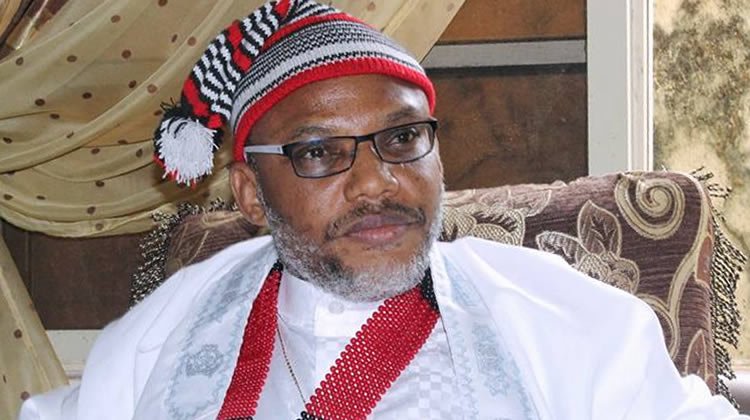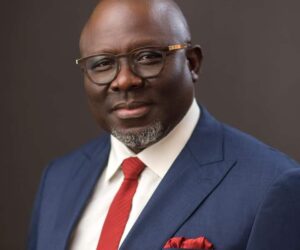2
…Abaribe Describes Kanu’s Life Sentence As Preconceived
…DSS Files Terrorism Charges Against IPOB Commanders
Mazi Nnamdi Kanu’s Legal Consultant, Aloy Ejimakor, on Thursday, said the Indigenous People of Biafra’s (IPOB) leader will appeal the Federal High Court judgment that sentenced him to life imprisonment.
Mazi Nnamdi Kanu was on Thursday, sentenced to life imprisonment by Justice James Omotosho of the Federal High Court, Abuja.
Ejimakor, who spoke with journalists shortly after Justice James Omotosho, the presiding judge, gave the ruling, said, “What kind of precedent is being laid here? We are heading to the Court of Appeal”.
“The Court of Appeal is the only court in this country, or the next court in this country, that sits as a jury; we are going to approach justices there to check out what happened in court today (Thursday).
“And we are pretty sure the justices will agree with us that today was the symbol of the travesty of justice that everybody has been suspecting.
“If the Court of Appeal disagrees with us, we head to the Supreme Court; Nnamdi Kanu is not going to stand convicted, he’s going to get overturned.
“This is the only day I have witnessed a man being convicted for mere pronouncements, just for what he said from his mouth, not what he did with his own hands.
“The verdict is not consistent with the evidence laid before the court; the sentence is overboard, cruel and unusual.
“How can you convict a man for making a mere broadcast from a location that was never named, and he never tied that broadcast to any single incident of violence, or even someone slapping someone, not to talk of terrorism?”
Kanu was on Thursday, sentenced to life imprisonment.
Conviction on a terrorism charge carries death penalty, however, Justice Omotosho held that taking into cognisance the merciful nature of God and Jesus Christ, coupled with the fact that he is a Christian, the court was minded to sentence Kanu to life imprisonment.
Specifically, the court sentenced Kanu to life imprisonment in relation to counts one, two, four, five and six of the seven-count charge.
For count three, relating to the offences of belonging to a proscribed terrorist group, Justice Omotosho sentenced the defendant to 20 years imprisonment without an option of fine.
On count seven, bordering on his unlawful importation of a radio transmitter for the purpose of furthering the clandestine activities of Radio Biafra, which is not registered in Nigeria, the trial Judge sentenced him to five years imprisonment without an option of fine.
The judge noted that Kanu had been unruly all through the trial, stressing that the law allowed the court to sentence him to death for the terrorism offence.
Justice Omotosho ordered that Kanu be kept in a protective custody in any part of Nigeria, but not in Kuje prison, Abuja.
Also, the court ordered that the radio transmitter be forfeited to the Federal Government.
Before the sentencing, the Prosecutor, Adegboyega Awomolo (SAN), had demanded death sentence for Kanu, to serve as deterrent to others but the court tampered justice with mercy.
Nnamdi Kanu has been a subject of a high-profile terrorism and treason trial in Nigeria, spanning a period of over 10 years.
Kanu was first arrested in 2015, but fled Nigeria while on bail in 2017, because of the military invasion of his home in Abia State.
In 2021, he was arrested in Kenya and forcefully renditioned back to Nigeria, an action he insisted, violated international laws and treaties.
Thursday’s judgment was the climax of his 7-count trial before Justice James Omotosho of the Federal High Court, over allegations of terrorism, treason etc.
Summarily, the amended 7-count terrorism charge filed under the Terrorism Prevention Act 2013 (amended in 2022), and one under the Criminal Code Act of Nigeria include: Acts of terrorism against the Federal Republic of Nigeria as leader of IPOB; inciting public violence and issuing unlawful sit-at-home orders resulting in shutdowns of banks, schools, markets, and other businesses in the South East; broadcasting threats that led to violent attacks on security personnel and their families; directing members of IPOB to manufacture bombs; importing and concealing a radio transmitter (Tram 50L) in a container of used household items smuggled into Nigeria.
In a judgment that lasted more than seven hours, Justice Omotosho convicted Kanu on all the 7-count charge preferred against him by the DSS, stressing that the prosecution lawyer, Adegboyega Awomolo (SAN), gave credible evidence to establish the Federal Government’s case against Kanu.
According to the trial judge, the threats of violence and killings, including the declaration of sit-at-home in the South-East states, coupled with the defendants many broadcasts constituted acts of terrorism.
On counts three, four and five, which bordered on Kanu’s membership of a proscribed terror group (IPOB) as well as inciting his followers to violence, the judge held that the prosecution tendered credible evidence to convince the court.
The court stated that the Federal Government lawyer, Awomolo, led substantial evidence to establish that Kanu belonged to IPOB, which had been proscribed and its affiliate, the Eastern Security Network (ESN).
More so, Justice Omotosho added that the prosecution proved that, by his many broadcasts, Kanu incited his followers to violence which resulted in the killing of security personnel and destruction of property, including police stations across the country.
Justice Omotosho held that the prosecution led sufficient credible evidence to establish its case against Kanu, stressing the court had no option than to believe the evidence as led by the prosecution since the defendant failed to enter his defence.
The trial judge said Kanu gambled with his defence by resting his case on that of the prosecution, a situation that was very fatal to his case.
Consequently, the court held that the prosecution made a case against Kanu, and having not entered defence, Justice Omotosho, therefore convicted the defendant on all 7-count charge.
Nevertheless, after the prosecution counsel had closed his case, Kanu was required to open defence.
Surprisingly, Kanu sacked his defence team led by a former Attorney General of the Federation and Minister of Justice, Chief Kanu Agabi (SAN), insisting he would defend himself personally.
Despite several adjournments and the Judge’s plea for Kanu to open defence, he vehemently refused, arguing that the court lacked the jurisdiction to prosecute him based on a repealed Terrorism Act.
Recall that the Supreme Court of Nigeria, had on December 15, 2023, ordered that Mazi Nnamdi Kanu, be returned to the Federal High Court, Abuja, to face trial on a 7-count charge.
The apex court gave the order while delivering judgment on an appeal by the Federal Government against the release of Kanu.
Justice Emma Agim, who read the lead judgment as prepared by Justice Garba Lawal held that the Court of Appeal was wrong to hold that Kanu could not be tried again based on the “illegality” perpetrated against him by the Federal Government, following the invasion of his home.
The Supreme Court explained that there is no law in Nigeria that robbed the Federal High Court of the jurisdiction to continue with Kanu’s case, despite the illegality perpetrated by the Federal Government against him.
Though the apex court had condemned the action of the Federal Government by using the army (Operation Python Dance) to invade the family home of Kanu during the pendency of his trial, the Supreme Court held that he can press for cost through a right enforcement action against the Federal Government.
In a unanimous decision, the 5-man panel of Justices, said the Federal Government acted “irresponsibly” when it forcefully invaded Kanu’s home and also renditioned him back to the country from Kenya.
The panel lambasted the Federal Government for going contrary to all known international treaties and local laws to forcefully effect Kanu’s arrest in Kenya.
It was the reasoning of the Supreme Court that the illegality perpetrated against the IPOB leader was not enough ground to divest the trial court of its jurisdiction to continue with his trial.
The court berated the Federal Government for not considering the image of Nigeria, both locally and internationally, before using the military to invade Kanu’s home and subsequent rendition from Kenya.
“You must enforce law in accordance with laid down laws, and not to resort to inhuman treatment”, the court said.
More so, Justice Lawal slammed the trial court for revoking Kanu’s bail after he escaped to save his life following the invasion of his home by security agents.
“In as much as we condemn the act of the prosecution (FG) in attacking the home of the defendant (Kanu) while on trial, we decided not to go with the decision of the Court of Appeal that his trial should be stopped due to the illegality of the prosecution, Justice Garba held.
The panel held that there’s no known law in the country to vitiate the trial, and that Nigeria is yet to develop to that level of stopping a trial due to illegality against a defendant.
Therefore, the apex court allowed the appeal of the Federal Government which had sought continuation of trial of Kanu on the remaining 7-count charge and dismissed the cross appeal filed by Kanu seeking his total legal freedom.
Mixed Reactions Trail Judgment Among Lawyers
Reacting to the judgment, Mr. Victor Opara (SAN), described it as a very unfortunate situation, noting that although the outcome is serious, it is not a hopeless case.
According to him, the defendant ought to have presented a strong legal defence, especially given the nature of the allegations.
“From the snippets of information available, this is a matter where a formidable defence team was necessary. Criminal procedure, particularly in capital or terrorism-related charges requires expertise. You may be brilliant or knowledgeable, but litigation involving the death penalty demands technical skill and structured legal strategy,” he said.
Opara expressed concern over the defendant’s decision to dismiss his lawyers and defend himself. “I do not understand what informed that strategy. There are several defences available in law, but you can only properly deploy them when you have a competent team.
“The lawyers initially on record are some of the finest minds in the country. I know them personally. They are sound and capable, and I expected a strong contest to the terrorism allegations,” he explained.
He noted that once the defendant chose not to defend the charges, the court was left with no option. “When you abandon your defence, it leaves the prosecution’s case unchallenged. An undefended case puts the judge in a position where he must rely solely on the evidence before him. And if the prosecution’s case is not tested or debunked, the court cannot manufacture a defence on your behalf,” he stated.
Igbo Chieftain Slams Court Ruling, Says FG Creating More Enemies
A prominent Ohanaeze Ndigbo chieftain and Lagos-based lawyer, who preferred not to be named, expressed strong dissatisfaction with the ruling, describing it as entirely predictable.
According to him, “I am too angry to fully address the judgment right now, but in due time I will. We all knew what they intended to do to him. At least now, they will have to move him into the general prison system. He has been kept in solitary confinement for years. But this government will learn the hard way. They are already battling Boko Haram, ISWAP, kidnappers, and even contending with international pressure like that from America, yet they still find ways to create more enemies at home.
“It seems that once people get into government, all sense of responsibility and clear tenure plans simply disappear”.
Akingbolu Hails Verdict, Says Justice Has Finally Been Served
A Lagos-based lawyer and human rights advocate, Mr. Kabir Akingbolu, has described the judgment as a welcome development, noting that it finally brings clarity and closure to a long-drawn process.
According to him, the ruling confirms that the defendant was given a fair trial rather than being held incommunicado or subjected to indefinite detention.
Akingbolu said the government had now presented its witnesses and allowed the legal process to run its course.
“At least we can now say justice has been done. Anyone who is dissatisfied can go on appeal. There is no basis for further controversy. He has been convicted by a competent court, and he is a criminal, now certified by law,” he stated.
He argued that the punishment should have been even more severe. “In fact, the offence warranted a death sentence. I don’t know why the judge opted for life imprisonment. Nigerians know how many families suffered and how many properties were destroyed because of his criminal activities. We remember the destruction in Lagos, burning, killings and the ongoing chaos in the East. Nobody is above the law,” he said.
Abaribe Describes Kanu’s Life Sentence As Preconceived
Former Senate Minority Leader, Senator Enyinnaya Abaribe, on Thursday bemoaned the conviction and sentencing of Mazi Nnamdi Kanu for terrorism, saying however that the outcome was foretold and not surprising.
Reacting through a statement in Abuja by his Media Adviser, Uchenna Awom, the senator said that the life jail handed down to Kanu was a preconceived plot that is not surprising to the Igbo nation and other right thinking Nigerians.
Abaribe said that at the time the Federal Government refused to factor in pleadings to extend the amnesty to Nnamdi Kanu as done to some others, “we knew that today’s (Thursday) outcome was imminent.”
“Is it not an irony that negotiations and peace deals with rampaging terrorists in the North East, North West were gleefully initiated by the local government, states and the Federal Government just like the amnesty to ex-militants in the South South, who were rewarded with lucrative oil pipeline contracts. This is to say that justice in Nigeria is not for the South East”, Abaribe further said.
DSS Arraigns 7 IPOB Commanders, Others Over Culpability In Terrorism
Meanwhile, the Department of State Services (DSS) on Thursday filed terrorism charges against seven IPOB key commanders linked to Simon Ekpa before a Federal High Court in Abuja.
In the three separate cases, FHC/ABJ/CR/632/2025; FHC/ ABJ/CR/633/2025 and FHC/ABJ/ CR/634/2025, filed on November 19, the seven suspects were accused of receiving funds and other material support from Simon Ekpa and other foreign-based members of IPOB.
In a statement sent in by Favour Dozie, Deputy Director, Public Relations and Strategic Communications, DSS noted that a key suspect, Ibrahim Ali Larabo, accused of terrorism financing, is an illegal immigrant from the Republic of Niger, operating a Bureau de change (BDC) without a licence.
According to the DSS, he allegedly provided financial services for the Simon Ekpa-led proscribed group, receiving and disbursing large sums of money for IPOB terrorism activities in the South-East.
The statement further added that the suspects were established to be IPOB commanders, arms dealers/couriers, ESN fighters, and foot soldiers funded and directed by Simon Ekpa, who has been convicted of terror-related charges and sentenced to six years imprisonment in Finland.








